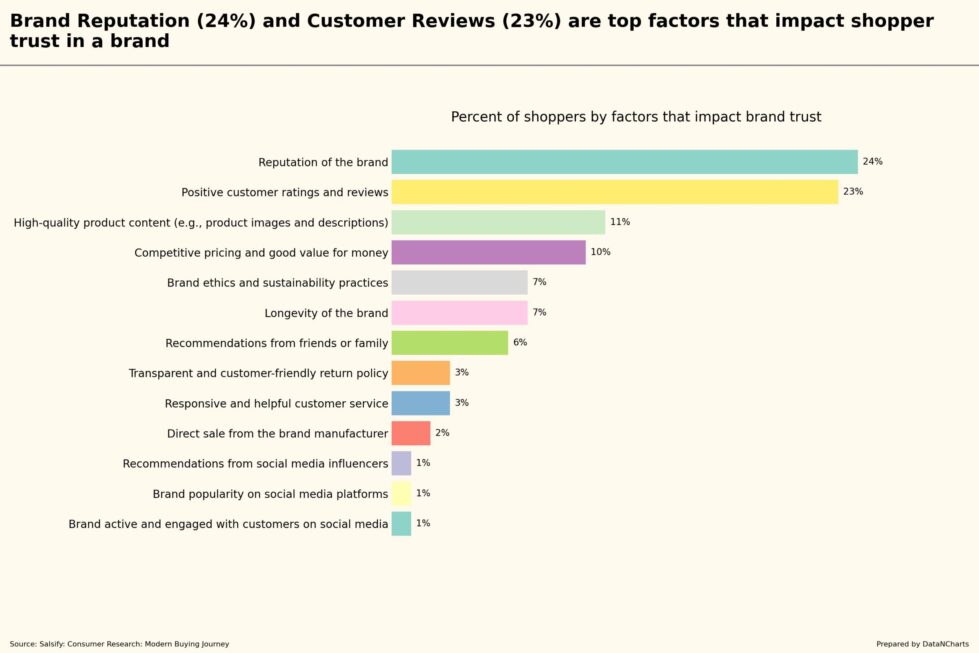Data Highlights
Nearly one-quarter (24%) of shoppers trust a brand based on its reputation.
Nearly one-quarter (23%) rely on positive customer ratings and reviews.
About one in ten (11%) value high-quality product content like images and descriptions, while a similar share (10%) trust brands that offer competitive pricing and good value.
A negligible share (7%) considers brand longevity and ethical practices important for trust, while a slightly smaller share (6%) relies on recommendations from friends or family.
A negligible share (3%) values responsive customer service and transparent return policies.
A negligible share (1%) is influenced by social media engagement, influencer recommendations, or direct manufacturer sales.
Scope
Trust plays a major role in the shopper path to purchase. Shoppers base their trust on real customer feedback, clear brand reputations, and strong product content—not social media activity or influencer endorsements. This brief examines key trust drivers, helping brands refine shopper journey analysis and marketing strategies.
Brand Reputation and Customer Reviews Build the Strongest Trust (24%, 23%)
Nearly one-quarter (24%) of shoppers trust brands with strong reputations, while another 23% rely on positive customer ratings and reviews. These are the most influential factors in shopper trust. Brands must actively manage customer feedback and maintain a positive brand image across all sales channels.
Beyond reputation, clear and accurate product content matters.
High-Quality Product Content and Competitive Pricing Enhance Trust (11%, 10%)
About one in ten (11%) shoppers trust brands that provide clear product descriptions, images, and details. Competitive pricing and good value for money (10%) also influence brand credibility. Retailers must ensure accurate content and transparent pricing to keep shoppers engaged.
Longevity and ethical business practices contribute to trust but play a smaller role.
Longevity and Ethical Practices Matter to Some Shoppers (7%)
A negligible share (7%) of shoppers factor in how long a brand has been in business or its ethical and sustainability efforts. While these elements reinforce trust, they do not drive most purchase decisions. Brands should highlight ethical efforts as an added advantage rather than a primary trust-builder.
Trust built through customer service and return policies also remains minimal.
Customer Service and Return Policies Have Limited Impact (3%)
Only a negligible share (3%) of shoppers consider responsive customer service and transparent return policies essential for trust. While these are important for long-term satisfaction, they do not strongly influence initial purchase decisions. Brands should maintain good service but focus on other trust-building areas.
Social media engagement has the least impact on trust.
Social Media, Influencers, and Direct Sales Have Negligible Influence (1%)
A negligible share (1%) of shoppers base trust on social media engagement, influencer recommendations, or direct sales from manufacturers. Digital consumer engagement on social media may build awareness but does not create strong purchase confidence. Brands should focus on reputation management rather than social media trust-building.
Insights and Opportunities
Brands must prioritize real customer validation, product clarity, and strong reputations to build trust and drive sales.
- Firstly, brands must actively manage customer reviews and reputation. Encouraging reviews, responding to feedback, and maintaining transparency increase shopper confidence. Brands investing in review management will see higher conversion rates, lower cart abandonment, and improved loyalty. Track effectiveness using customer ratings, review volume, and trust score improvements.
- Secondly, improving product content quality enhances brand credibility. Detailed descriptions, high-resolution images, and accurate product specs reduce hesitation. Brands ensuring product clarity can expect increased engagement, lower return rates, and higher purchase confidence. Measure success through conversion rate improvements, product page engagement, and return rate reductions.
- Finally, while ethical practices and social engagement play a minor role, they should complement core trust-building efforts. Brands incorporating sustainability messaging and responsive customer service may see improved long-term loyalty. Retailers can measure success through repeat purchase rates, brand sentiment analysis, and customer retention metrics.
By focusing on reputation, product clarity, and customer validation, brands can effectively strengthen shopper trust and improve the customer journey.
